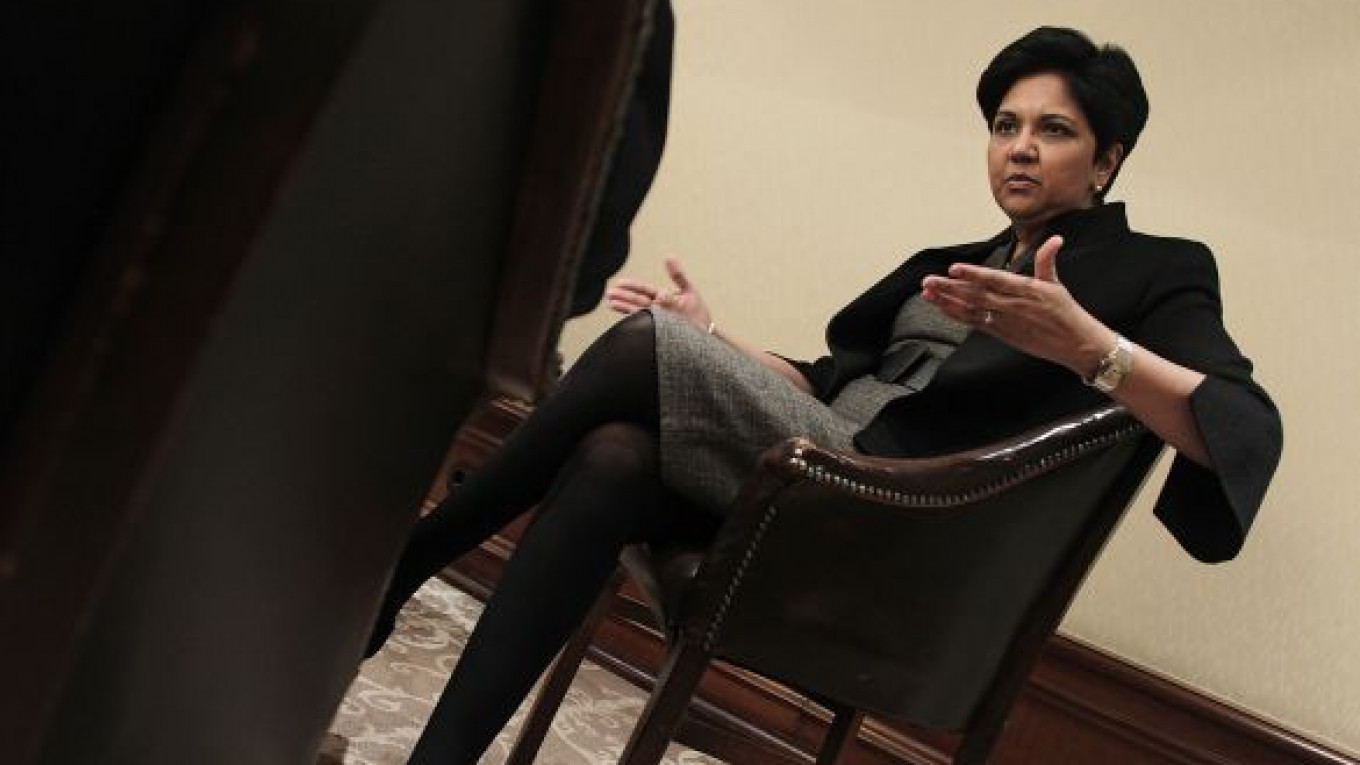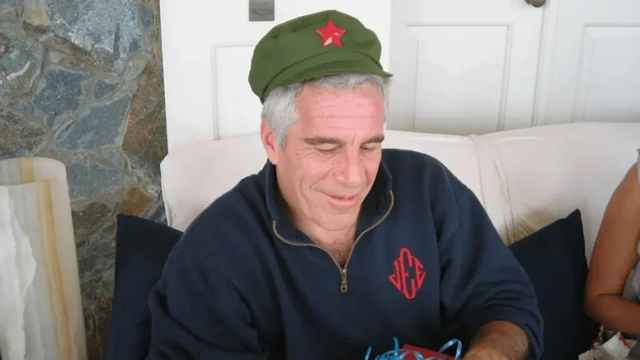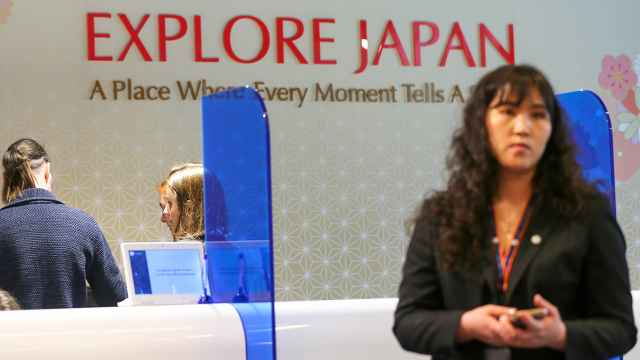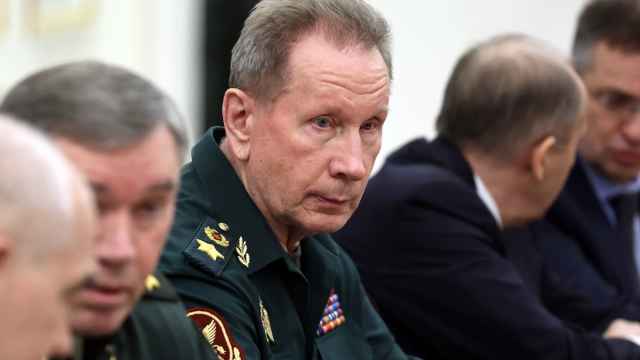Indra Nooyi, chairman and CEO of PepsiCo, stood beside a table stocked with bottles bearing names like Tonus, Tropicana and Ya — a colorful mix of local and international brands that her company produces in Russia.
As she spoke, a hushed group of about 20 reporters, photographers, television cameramen and PepsiCo associates stood listening, some hastily scribbling in notebooks, others snapping pictures.
"I am pretty sure you are very familiar with our business, and I will not dwell long on our history in Russia," Nooyi said, holding seven sheets of white paper fastened together with a large metal paperclip.
Education
1974 — Madras Christian College, BS in physics, chemistry and mathematics
1976 — Indian Institute of Management Calcutta, MBA
1980 — Yale School of Management, master’s degree in public and private management
Work Experience
1980-86 — Boston Consulting Group
1986-90 — Motorola
1990-94 — Asea Brown Boveri
1994-Present — PepsiCo, where Nooyi served as senior vice president for strategic planning (1994-96); senior vice president of corporate strategy and development (1996-99); senior vice president and chief financial officer (2000-01); president and chief financial officer (2001-06); and CEO since 2006 and chairman since 2007.
"Of course, you all know of Don Kendall, PepsiCo's inspirational leader, who first brought Pepsi to the Soviet Union in 1959," she said. "In 1974, our first Russian plant was opened in —" she paused for a split second and glanced at the sheaf of papers, "— Novorossiisk."
Then she paused again and smiled. "Did I say that right?"
Her pronunciation was pretty close.
But Nooyi had some help. At the bottom of one of the pages of her printed speech she had made a note to herself in black ink: the phonetic transliteration of Novorossiisk's name. Beneath that, she had also started to write the Black Sea port's name in Tamil, the language of her native Chennai, India. But she had changed her mind and crossed it out.
This attention to detail might help explain why Nooyi, who has steered the world's second-largest food and beverage company for five years, is enthusiastic about Prime Minister Vladimir Putin. Nooyi, who spoke shortly after meeting with Putin at the Foreign Investment Advisory Council, or FIAC, this week, said in a subsequent interview that she was impressed with Putin's detail-oriented approach to leadership.
"I have been in meetings with many, many world leaders. But when it came to FIAC attendees, the issues and the comments they made, Prime Minister Putin was on top of every issue," she told The Moscow Times. "He knew the facts. … This tells me that Russia is open for business."
Regarding Russia, there are some facts that are important for Nooyi. One is that Russia is PepsiCo's largest market outside the United States. Another is that the company has sunk $9 billion into the country over the past decade and is currently investing another $1 billion. About 25,000 people, or more than 8 percent of the company's global work force, are based in Russia — though some might not be here for long. PepsiCo is keen to export its local talent abroad, Nooyi said.
"We view our Russian talent as people who in time will take up positions globally, and we have examples already from Lebedyansky," she said, referring to the fruit-juice and baby-food company that PepsiCo acquired for $1.4 billion in 2008. Her company also bought Wimm-Bill-Dann, Russia's biggest juice and dairy producer, last year for $3.8 billion.
These kinds of big figures roll easily off Nooyi's lips. In her remarks to reporters at the Marriott Royal Aurora Hotel, Nooyi rattled off figure after figure — and the ones involving money inevitably topped $1 billion.
But Nooyi — ranked by Fortune magazine for the past five years in a row as the world's most powerful businesswoman — also showed an amiable side during a brief interview after the speech. Poised and attentive, she spoke softly as she explained why she believes Russia is a good place to invest and told how she seeks inspiration from world leaders and her housekeeper alike. She acknowledged that success can be fleeting, and readily shared her own notes from her speech with a reporter.
Nooyi, who turns 56 next Friday, also squealed with delight when presented with a photograph of a young boy carrying a bottle of Pepsi down a Moscow street, shot by Moscow Times photographer Vladimir Filonov on a sizzling day this summer.
"What a wonderful picture, look at this!" she said, smiling broadly. "I've got to frame this, got to frame this. This is gorgeous."
This interview has been edited for length and clarity.
Q: How do you successfully manage people and business in an emerging market like Russia?
A: You should not approach an emerging market through the lens of a developed market. You have to think of an emerging market in terms of what its needs are, what its concerns are and what its issues are. Food and beverage in particular are so local. They pertain to local tastes, local habits and, most important, local tradition. So you've got to reach out to people and learn from them as opposed to telling them that you have the answers. We get Russian people to tell us how we should tailor our model for Russia.
Q: Can you give an example of how you are doing that?
A: We have talked about what we can source from Russia that is good for the Russian palate. We have looked at juice combinations and flavor combinations that are good for the Russian palate. With snacks, we start with Lay's "Simply Salted," but the flavors that we have for Lay's are certainly not "Salt and Vinegar" or "Tomato Ketchup" like in the United States. Here we have "Red Caviar" and "White Mushrooms With Sour Cream." These are flavors tailored for the Russian consumer, and now with the addition of Wimm-Bill-Dann we are really learning about the Russian consumer in incredible ways.
Q: With your experience working in emerging markets, what advice would you offer a large foreign investor interested in entering Russia or making a major investment here?
A: Let me start off by saying that it's not just that I work in emerging markets — I feel emerging markets. So I understand them at a very fundamental level.
I think Russia is an incredible country to do business with. It's got great people. It's got national resources. It's a well-managed country in so many ways. But I think Russia's reputation to the outside world is not completely in sync with what Russia really is. I think many investors just don't understand the potential of Russia. They don't understand that Russia is actually a great place to do business. I mean, we have been here over 50 years, and we have invested $9 billion in the last decade. That is the single largest investment we have made in any country in the world. We are betting $9 billion on 140 million people. The reason we are doing that is because we think Russia has potential. I'm actually glad others haven't seen the potential because it gives us an opportunity to come and invest.
Still, I think people should understand that Russia is a country with enormous potential. So the advice I give people who ask me about Russia is this: Look at modern Russia; modern Russia has industrialized in a very planful way. Look at the FIAC meeting today. I have been in meetings with many, many world leaders. But when it came to FIAC attendees, the issues and the comments they made, Prime Minister Putin was on top of every issue. He knew the facts. He answered each question thoughtfully. He is the prime minister of one of the most powerful countries in the world, and he did a magnificent job answering those questions during the two hours that he was with us. This tells me that Russia is open for business. It wants foreign investment. But it wants foreign investment to come in a responsible way that is good for Russia. The prime minister stands committed to removing obstacles to make sure foreign investment can actually help Russia make progress. In fact, many of us reported back to FIAC on things we had asked for at our last meeting. Progress has been made. The report card was very, very good. I think people in Russia should be very proud of what we saw today.
Q: Who inspires you?
A: There is not just one person who inspires me. I look for people who have a story to teach me. It could be a world leader who has a very interesting perspective on a particular issue. I might do more research on that person. Likewise, it could be a PepsiCo salesperson or a janitor at PepsiCo. There was a secretary at PepsiCo who went through a lot of problems, and I learned a lot from that person. I talk to the person who cleans our home. She has a tough life, and I listen to her stories for hours because I want to understand how somebody who lives her life can still smile through it all. We all look successful today, but we don't know what we are going to look like and be like tomorrow. I think that at every point in life we should understand that success can be fleeting. You should make sure that you learn from everybody who is out there to better yourself as a person.
Q: Why do you smile?
A: I love life. I love the company I run. We have extraordinary people, and I derive my strength from them. I get up every morning waiting to come to work. I don't want to sleep because I am afraid that if I sleep I might miss going to work early in the morning. I am one of those people who truly loves the company. You just have to meet our people in PepsiCo, and you will know why I love what I do.
A Message from The Moscow Times:
Dear readers,
We are facing unprecedented challenges. Russia's Prosecutor General's Office has designated The Moscow Times as an "undesirable" organization, criminalizing our work and putting our staff at risk of prosecution. This follows our earlier unjust labeling as a "foreign agent."
These actions are direct attempts to silence independent journalism in Russia. The authorities claim our work "discredits the decisions of the Russian leadership." We see things differently: we strive to provide accurate, unbiased reporting on Russia.
We, the journalists of The Moscow Times, refuse to be silenced. But to continue our work, we need your help.
Your support, no matter how small, makes a world of difference. If you can, please support us monthly starting from just $2. It's quick to set up, and every contribution makes a significant impact.
By supporting The Moscow Times, you're defending open, independent journalism in the face of repression. Thank you for standing with us.
Remind me later.






